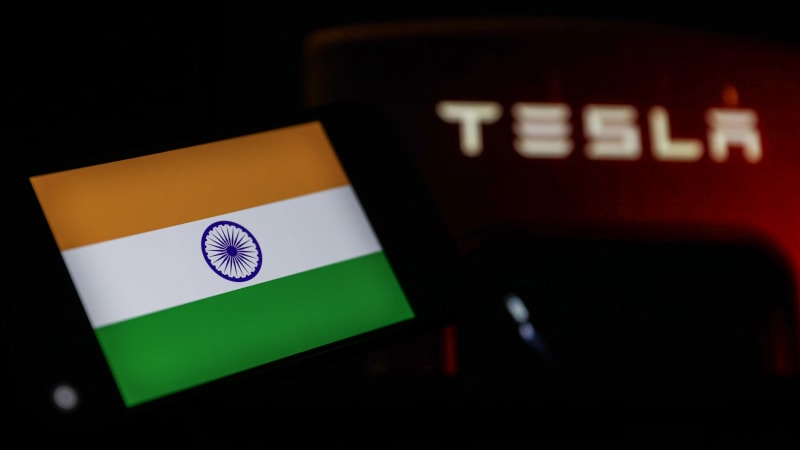NEW DELHI — India on Friday lowered import taxes on certain electric vehicles produced by carmakers that commit to invest at least $500 million and start domestic manufacturing within three years, bolstering Tesla’s plans for the market.
The policy is a big win for Tesla as it’s in line with what the company had been lobbying for in New Delhi, despite pushback from domestic carmakers.
Tesla CEO Elon Musk has been trying to enter the Indian market for years, but New Delhi wanted a commitment to local manufacturing. Tesla officials visited India several times over the last year, with Musk meeting Prime Minister Narendra Modi in June.
Sources said in July that the U.S. carmaker had offered to produce a $24,000 car at a yet-to-be-built factory but wanted a cut in import taxes that Musk said were among the highest in the world.
Under the new policy, effective immediately, companies that meet the requirements will be allowed to import up to 8,000 EVs costing $35,000 or more a year at a lower tax rate of 15%. India currently levies a tax of 70% or 100% on imported EVs depending on their value.
Tesla’s cheapest vehicle, the Model 3, starts at $38,990 in New York, according to the company’s website. Tesla did not respond to an email seeking comment.
“We invite global companies to come to India. I’m confident India will become a global hub for EV manufacturing and this will create jobs and improve trade,” commerce minister Piyush Goyal told reporters at a press briefing.
India’s EV market is small but growing, with domestic carmaker Tata Motors dominating sales. Electric models made up about 2% of total car sales in India in 2023, with the government targeting 30% by 2030.
EV imports at the lower tax rate will be allowed for a maximum of five years. The duty foregone would be limited to the investment made by the company or around $800 million, whichever is lower.
Tesla vs. rivals
The policy comes at a time when global EV sales growth is otherwise slowing.
This will open up the world’s third-largest auto market to new carmakers, suppliers, technologies and the overall EV ecosystem, said Gaurav Vangaal, associate director at S&P Global Mobility.
“Multiple carmakers, who are sitting on the fence, would now like to enter India,” he added.
Tesla, weighed down by a lack of entry-level vehicles and the age of its line-up, is battling a decline in demand and stronger competition from rivals like China’s BYD.
BYD wants to invest in building EVs in India but has been stalled by New Delhi’s strict investment rules for countries sharing the land border.
Vietnam’s VinFast, which also wanted lower EV import taxes, plans to invest $2 billion and last month began constructing a factory in the southern state of Tamil Nadu.
India has been working on the EV policy for several months despite lobbying from Tata Motors and rival Mahindra & Mahindra .
The Nifty Auto index ended a volatile session 1.6% lower. Mahindra was the biggest faller, losing 4.8% while Tata Motors was down 2.3%.
The objective of the new policy is to “strengthen the EV ecosystem by promoting healthy competition among EV players,” the commerce ministry said.

